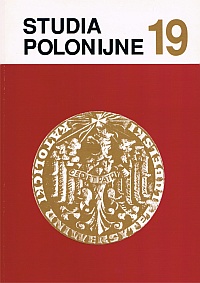The Experienced and Lived World and the Problem of Autoidentification. An Analysis of Autobiographic Memories and Reports of the Inhabitantis of Nalibok (Belorus)
Main Article Content
Abstract
In the years 1922-1997 the author conducted field research, whose aim was to show the process of the forming of national and cultural identity among the Poles from Belorus and the profile of the changes that had undergone in the functioning of some local communities under political transformations. (The inhabitants of the village Naliboki constitute one of such communities). The method the author used consisted in analyzing the contents of the autobiographic reports and memories of the people representing the community under study.
The paper depicts an image of "friends" (Poles-Catholics) and "others" − the closest neighbours to whom belonged the Orthodox believers, called Russkis, and Jews (some interlocutors rated them among the category of "friends"). A separate category is constituted of "strangers" (Soviets and Germans), the nations which came to Naliboki during the Second World War.
The principal indicator of the particular communities and the basis for the autoidentification of the people under study was their religion. The kind of occupation and their language were less important. The (incomprehensible) language appears as an indicator of the "strangers." Moreover, they hold a negative attitude towards religion (atheism). The subjects valued cultures in their statements. The culture of the Russian (Orthodox) population was regarded as inferior to the culture of the Poles-Catholics. In like manner Soviet culture was deemed inferior to Polish and German cultures.
The author has recreated the more important elements of a "little history" of Naliboki, as it was remembered, experienced and lived by its inhabitants. The breakthrough events here are the following: the Second World War and the post-war period when homeland was lost and political transformations took place. It follows from the author's research that the issue of national membership took on significance only during the war. At the same time, the collaboration of some of "friends" and "others" with "strangers" affected their image and worsened the hitherto relationships between particular groups. The paper has shown also the basic values the community under research shared. We list here: private property, close family and neighbourly ties and religion, penetrating all spheres of life. After the war the values had been replaced with antivalues (kolkhozes, atheization, loosening of social ties, and the fall of former authorities).

